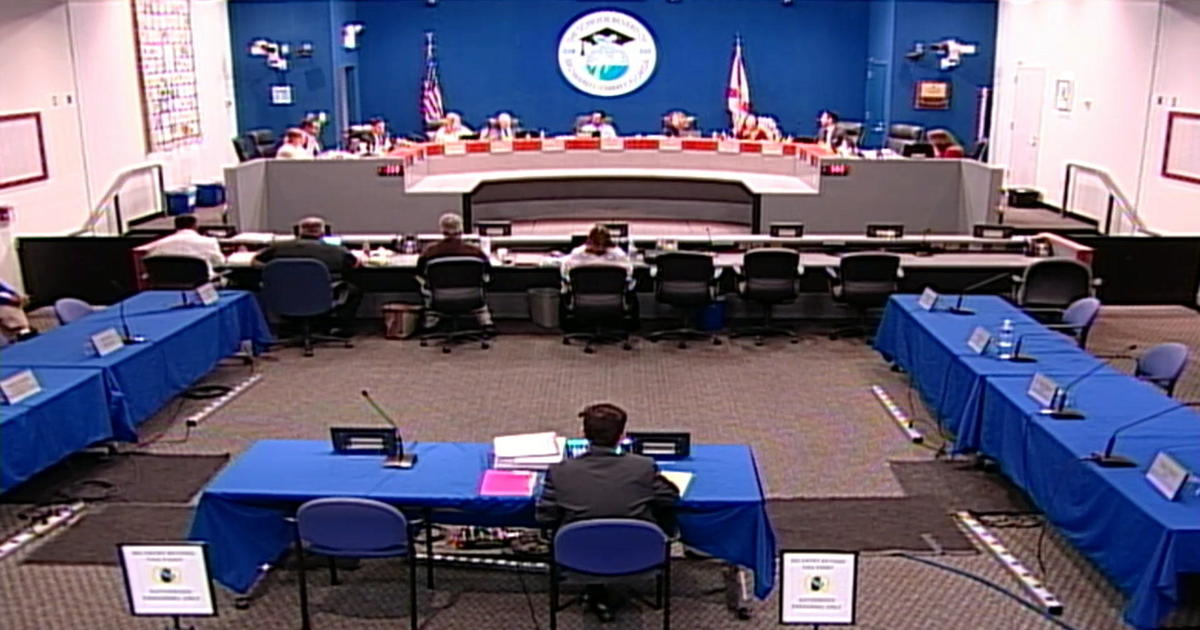Galvano: No Intent To Favor GOP In Redistricting
Follow CBSMIAMI.COM: Facebook | Twitter
TALLAHASSEE (NSF) – The Senate redistricting chief on Wednesday defended a proposed map of the chamber's 40 districts, telling a Leon County judge that it was happenstance that the plan submitted to the court by the Republican-dominated Senate was one of the best for the GOP.
Senate Reapportionment Chairman Bill Galvano, R-Bradenton, testified before Circuit Judge George Reynolds on the third day of a trial that could determine the future of several of Galvano's colleagues. Reynolds is supposed to recommend to the Florida Supreme Court one of five maps for Senate districts: a plan overseen by Galvano, or one of four proposals offered by a pair of voting-rights organizations.
Reynolds is charged with selecting a map under a legal settlement between the Senate and the voting-rights groups, after lawmakers conceded that current districts would likely be struck down under a voter-approved ban on gerrymandering. A special session intended to craft a new set of districts collapsed in November without an agreement between the House and Senate.
That led the Senate to submit the plan by Galvano, who combined pieces of two "base maps" drawn by redistricting aides in the run-up to the special session. But in doing so, lawyers for the voting-rights groups contend, Galvano created a plan that was one of the most favorable for Republicans, avoided the prospect of GOP incumbents having to run against each other and does worse than other maps on measurements like how compact the districts are and how well they follow city and county lines.
During his testimony, though, Galvano repeatedly pushed back on the idea that political considerations played a role in putting together his plan, even as attorney David King raised questions about the "coincidences" in Galvano's map.
"Call it what you want; it was not anything that was engineered," Galvano said.
Instead, Galvano testified that he was trying to come up with something of a compromise between a map that the Senate approved during the session, which went nowhere in the House, and a plan that passed the House only to fail in the Senate.
The combined base map did that, he said, because it addressed the House's concerns about lawmakers making significant changes to the staff-drawn maps, as the Senate did when it approved an amendment by Sen. Miguel Diaz de la Portilla, R-Miami. At the same time, Galvano's new plan lessened the split of Little Havana, one of Diaz de la Portilla's concerns with the base map that the Senate considered.
The House has deferred to the Senate in the current redistricting trial.
King was skeptical of Galvano's explanation, saying that similar stories had cropped up repeatedly in the legal battles over the congressional and legislative maps, which have been raging for almost four years.
"Isn't it correct through the history of this litigation, Mr. Galvano ... the coincidences just keep happening, and they keep improving the Republican position? Isn't that correct, sir?" King asked.
"I don't know if that's true or not," Galvano said, as a lawyer for the Senate objected to the question.
King zeroed in on the fact that, unlike several other maps produced during the redistricting process, the plan put forward by Galvano would not pair any Republican incumbents. Other maps would have led to GOP lawmakers, including some legislative leaders, running against each other.
"Once again, it's just pure luck of the draw that this keeps happening?" King asked "You keep rolling sevens on unpairing of incumbents?"
"I wouldn't consider myself very lucky," Galvano replied, tongue apparently in cheek. "I'm sitting here today, on Dec. 16."
Under questioning from Raoul Cantero, a former Supreme Court justice handling the redistricting litigation for the Senate, Galvano noted that incumbents who are paired together often avoid a conflict by having one of the members move to a nearby district.
"That happens more frequently than you would imagine in the legislative process," Galvano said. "People will make those calculated decisions."
He said preserving an elected official's political base in the same district is often more important than making sure that the senator actually lives in the district when the maps are drawn. And Galvano pointed out that one of the maps put forward by King's clients also would not create any paired incumbents.
"It's just how it works out sometimes," Galvano said.
Reynolds also heard from John O'Neill, a consultant for the voting-rights organizations, which include the League of Women Voters of Florida and Common Cause Florida. O'Neill, who is also an employee of a Democratic political consulting firm, drew the maps that the organizations have put forward as alternatives.
Lawyers for the Senate highlighted excerpts of a deposition earlier this month in which O'Neill seemed evasive about emails at his firm, Strategic Telemetry, that showed efforts to make maps favorable to Democrats to submit as the once-a-decade redistricting legislative process was underway in 2011.
In court on Wednesday, O'Neill said he remembered the conversations more clearly after having time to study the emails, and that he didn't consider any impermissible political calculations when drawing his latest maps. But O'Neill said he couldn't recall exactly when he realized that the Senate's portrayal of the emails during his deposition was accurate.
The News Service of Florida's Brandon Larrabee contributed to this report.



